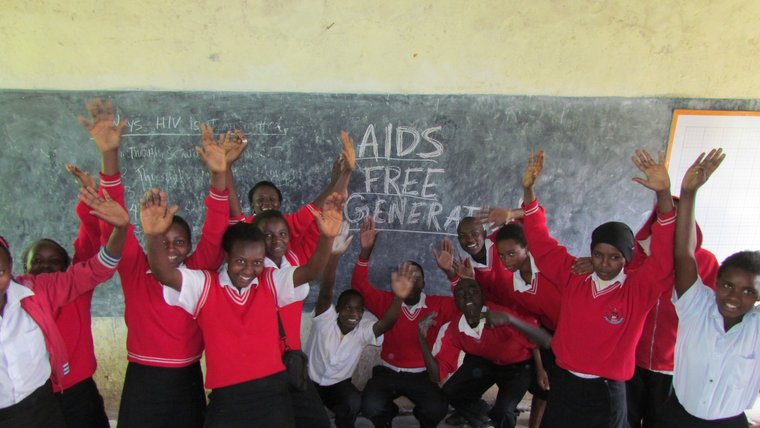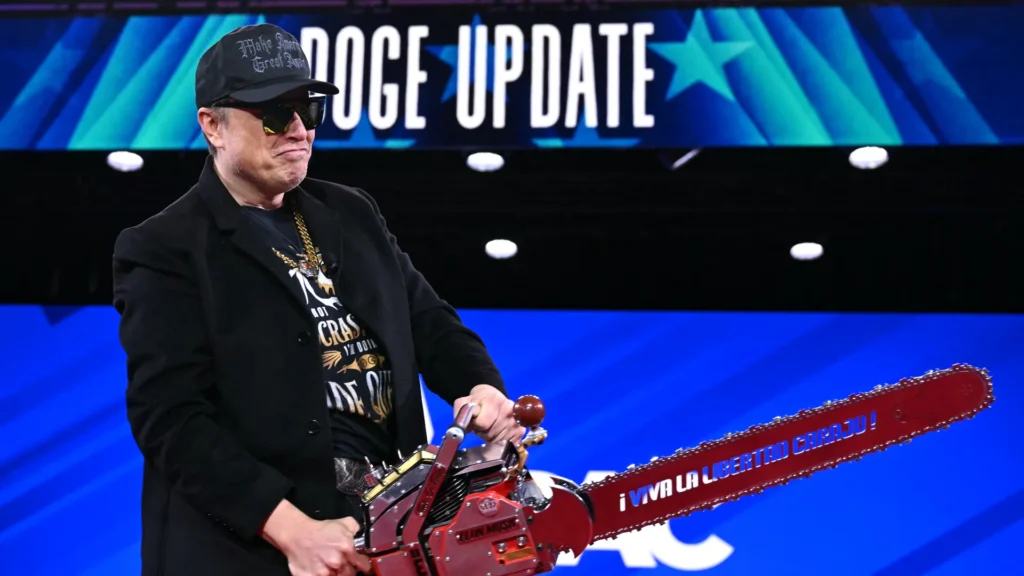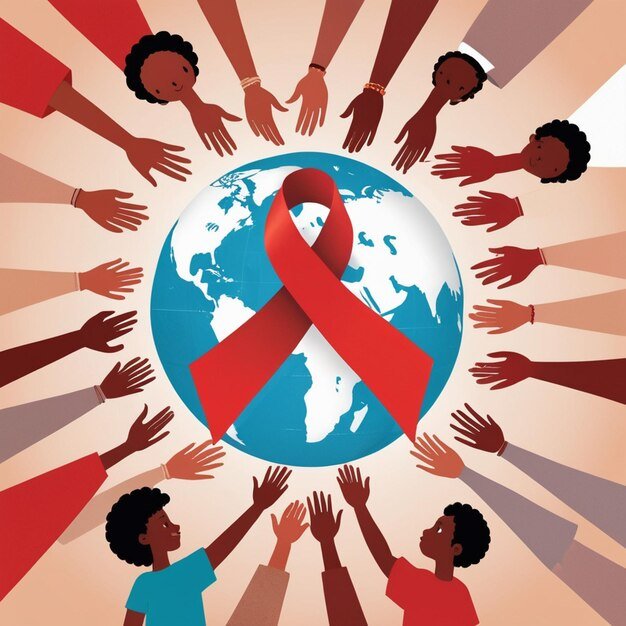Nine days after the new President of the United States took office and unleashed an unelected billionaire to wreak havoc in American institutions and programs with little or no thought to the real-life consequences for millions of people both in this country and worldwide, I wrote about the impact this clown car of an administration was having on an issue that is both very important, and very personal, to me, as an American and as a citizen of the world: I am, of course, talking about the global effort to treat HIV/AIDS and prevent its deadly spread.
I have HIV. I am very fortunate because I have prescription insurance to help cover the cost of my drugs, I participate in a program called ADAP (the AIDS Drug Assistance Program) which covers HIV-specific medications (like the Biktarvy I take to, literally, stay alive; without ADAP, Biktarvy’s co-pay would be a cost-prohibitive $1000 a month) and I have resources of my own. For 27 years, 28 this August, I have had access to top-notch medical care, which includes both doctors and specialists in private practice, and four, significant hospitalizations.
I am surviving with HIV. I am living the best life I can. But for those two things to be true, I require access to medication and to treatment. I have those things. Much of the world did not until the United States of America stepped up.

The diamond in the rough of George W. Bush’s presidency is the ambitious undertaking of combating the HIV epidemic around the world – PEPFAR, the President’s Emergency Plan for AIDS Relief, established in 2003. Today, PEPFAR accounts for somewhere around 70% of the total funding for the global response to HIV.
But now, with the mercurial stroke of his sharpie, Bozo the President axed by executive order the PEPFAR program in the initial freeze on foreign aid grants. Then, just last month, on February 27th, the Secretary of State, Marco Rubio, whose department is responsible for administering the program, signed off on cuts affecting more than 90% of USAid grants, including the termination of US global HIV funding.
According to a document found on the State Department’s own website, PEPFAR Latest Global Results & Projections Factsheet, at the end of 2024 (and therefore, the last administration) the program was funding the treatment, across 55 countries, of more than 20 million people (a number which includes over 560,000 children); it was supporting over 90% of the effort to use pre-exposure prophylaxis (PrEP) to prevent new infections; it was funding the testing of 83.8 million people (up from 71 million the year before); and it was directly supporting 342,000 health workers around the world.
According to our own National Institutes of Health (NIH), part of the Department of Health and Human Services (HHS), 400,000 people living in low and middle-income countries had access to lifesaving anti-retroviral drugs to manage the virus when PEPFAR began in 2003. That number is now more than 25 million people according to the World Health Organization (WHO).
Or should I say was?
The tragedy here is that PEPFAR showed both the relevance and the importance of humanitarian aid and how it can support and transform lives in countries less fortunate than our own. Add to that, PEPFAR played a major role in stemming the tide of the HIV epidemic, while simultaneously enabling many infected with the virus to lead full, active lives. It was responsible for major reductions in the number of people newly infected. And all this was done with broad bipartisan support in Congress.
It is very strange indeed to think ‘well maybe this will get reversed,’ but that is the new normal. Just look at the last month. The administration threatened tariffs, backed off, then did the tariffs, and then started carving out exceptions. It made a big show of ICE raids and military deportation flights initially then stopped because they found it was too expensive. One executive order tried to end constitutionally guaranteed birthright citizenship, but a judge has put that on hold. And the ketamine kid, Elon Musk, and his so-called Department of Government Efficiency (DOGE) indiscriminately slashed the federal workforce, with Elon famously wielding a real chainsaw, then sent ‘oops, sorry, didn’t realize we needed you’ emails hiring many people back. Leaving us all with whiplash.

Even if this ill-advised decision to gut PEPFAR were reversed, the disruption caused by the initial freeze and stop-work order was immense. And it goes beyond HIV to impact wider public health issues, especially those related TB (tuberculosis), STDs (sexually transmitted diseases), and reproductive health care.
But, remaining focused on the disastrous effects of dismantling PEPFAR, in countries where US funding accounts for about two-thirds of the HIV prevention and treatment budget, the impact is particularly gruesome; epidemiologist Peter Piot, the former head of UNAids (The Joint United Nations Programme on HIV and AIDS), has raised the prospect of countries like Zimbabwe and Zambia running out of lifesaving drugs. Treatment programs in Lesotho, Eswatini, and Tanzania have already had to close. One organization serving 350,000 people both in the United States and abroad includes 10,000 pregnant women living with HIV who require treatment for their own health and to prevent passing on the virus to their unborn child.
Just this last weekend, Kelsey Piper at Vox reported:
No one in Rubio’s State Department or in DOGE has said they want to cancel PEPFAR — Rubio has in fact repeatedly spoken out in favor of it in the past — but it was hit by a stop-work order. And even after many PEPFAR programs were issued waivers, funding wasn’t unfrozen, contacts at USAID had been fired or placed on leave, and work in most cases wasn’t able to resume.
Some PEPFAR programs were then sent termination notices. The Elizabeth Glaser Pediatric AIDS Foundation, which treats HIV+ pregnant women to prevent their babies from contracting HIV in the US and overseas, got a cancellation notice for programs serving more than 350,000 people.
So that’s the state of play. We were addressing a global health crisis, making great strides, and even seeing our investment decrease while continuing this important work – the cost to the US for PEPFAR peaked in 2009; thanks to falling drug prices, every year since then the number of patients treated has increased while the amount of money spent has decreased. You can’t ask for better value for money.
And, in many countries, PEPFAR has successfully transitioned financial responsibilities to local governments, like South Africa, where the program provides only 25% of the medications, with the balance coming from the South African government. But in countries like Nigeria, where PEPFAR is 90% of HIV funding, patients are out of luck. It is estimated we’ve thrown 20 million people off crucial lifesaving medications and the Foundation for AIDS Research (amfAR) is telling us that every day 1,400 babies will be born with HIV who would otherwise be HIV-free if we hadn’t frozen the programs meant to help their mothers. Now just take a moment and let that number sink in: 1,400 babies a day born with a deadly virus because of what our government in Washington DC is doing to PEPFAR!

Bottom line: in A Citizen Review of PEPFAR Effectiveness, the authors conclude about a million people will die every year as a result of the administration’s actions. All this to save a meager 0.08% of the federal budget.
And here I thought they were supposed to be pro-life.
